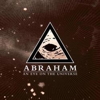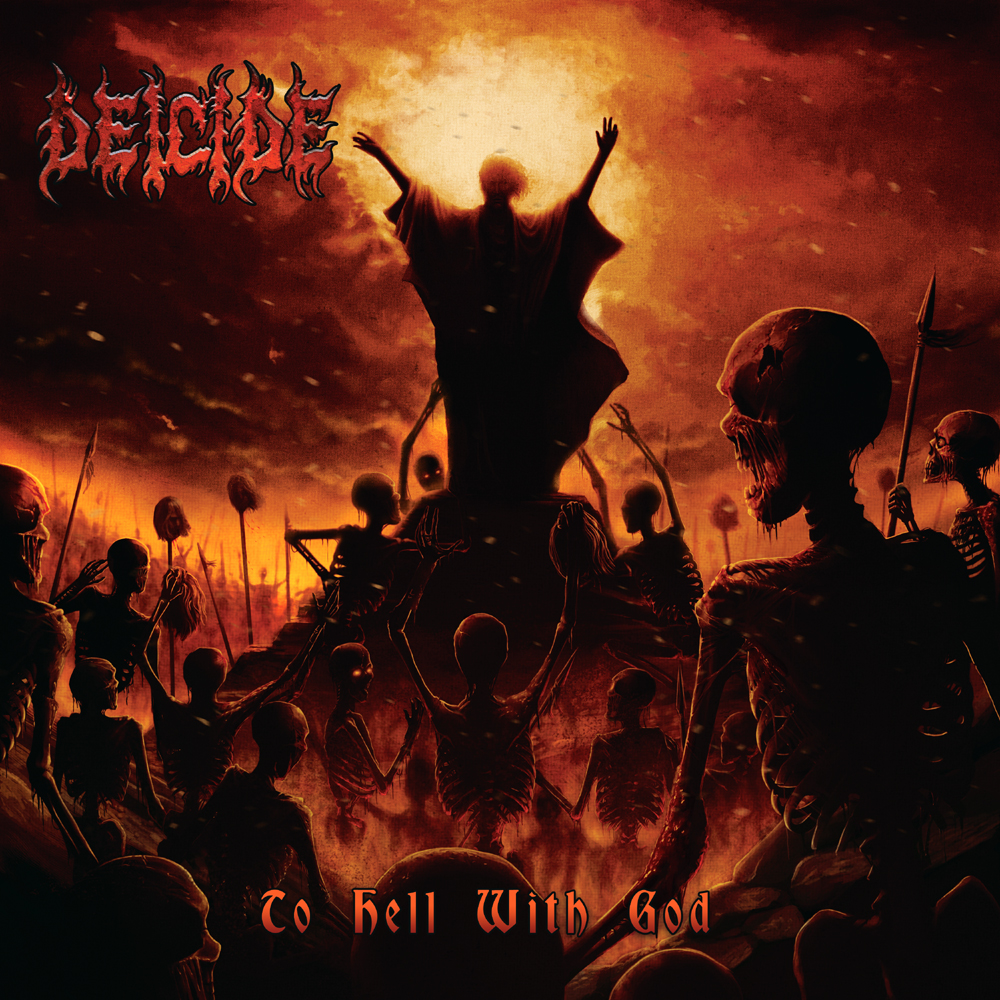Decide was, for many years, the Old Faithful of Florida death metal. While other bands would come and go, form and re-form, expand their sound into tech-death or prog-jazz or contract it by way of ‘getting back to the basics’, Glenn Benton and his not-so-merry men could be counted on to release, year after year, a reliable album of blistering guitar mayhem and unhinged spew directed at poor ol’ Jesus Christ. Come 2004, though, a band that was, if nowhere near groundbreaking, at least stopwatch-reliable underwent its first major personnel shakeup. Brian and Eric Hoffman, whose dual guitar attack had come to define Deicide’s sound, left the band, and Jack Owen and Ralph Santolla stepped in to replace them. Many fans felt this was a welcome rejuvenation of a group that had begun to stagnate; others thought it was an unwelcome tampering with a formula that needed no such trifling. I was in the latter camp; 2006’s The Stench of Redemption was no radical departure from the Deicide house style, but I didn’t feel that Owen and Santolla had really gotten comfortable working with Benton, and the result was, while not a disaster by any means, a fairly minor addition to the band’s catalog. Unfortunately, the disaster hadn’t been avoided, but merely postponed: the 2008 follow-up, Till Death Do Us Part, was a dreary reckoning of Benton’s failed marriage, with his ex-wife filling the role normally occupied by Christ. I don’t give a shit about Glenn Benton’s love life, and from the lackluster sound of the album, neither did anyone else in the band. (To be fair, I don’t give a shit about Glenn Benton’s opinions of Jesus, either, but at least his blasphemous stuff is delivered with genuine emotion and power. On Till Death he just sounds pissy.) Happily for those who still consider Deicide an essential part of any death-metal breakfast, To Hell With God is a fine — and long-overdue — return to form. Glenn is back to hating the religious icons he was born to hate; Kevin Quirion, who I thought was a pretty poor replacement for the now-absent Ralph Santolla, finally sounds like he’s settled in and is ready to deliver; the songwriting is solid if unspectacular, marked by chugging death-metal choruses that are easy to bang along with (see especially the one-two punch of lead-off single “Hang in Agony Until You’re Dead” and “Servant of the Enemy”). Best of all, it’s short and to the point; it gets in and out, says its piece, and doesn’t overstay its welcome, avoiding one of the uglier new developments in DM. Deicide is the death metal equivalent of comfort food, and it’s good to see Benton is still capable of serving it up.
 BONUS: Pioneering Celtic metal outfit Cruachan has been gone so long — their last album appeared five years ago, just as Viking metal was starting to take their ball and run away with it — that they must have gotten nervous their fans had forgotten about them. That might account for the sound of Blood on the Black Robe, which sounds hastily assembled even though they’ve had half a decade to work on it. I may not be the ideal audience for this stuff — with a few notable exceptions, I’ve never been a huge fan of metal influenced by the various flavors of folk and/or ‘world’ music — so maybe its fans have a higher tolerance for the martial sameness of the rhythms and the verse-breakdown-rinse-repeat cycle of the songs. Fan of tin whistle will find a lot to enjoy here, and I honestly don’t mind Keith Fay’s Gaelic snarl; it’s an enjoyable midpoint between clean vocals and the death metal growl. But the songs are awfully repetitive, and the Irish coloring serves largely to show how deficient the actual metal is. They’re also terribly padded, and the lyrics aren’t nearly interesting enough to be repeated over and over the way they are. This album was promised as a return to the band’s early form, and they’ve definitely added some death metal and black metal tint, but it’s mostly just there as coloration. Which is too bad, since the few tracks, like “Thy Kingdom Come”, where they really commit to it are by far the album’s standouts.
BONUS: Pioneering Celtic metal outfit Cruachan has been gone so long — their last album appeared five years ago, just as Viking metal was starting to take their ball and run away with it — that they must have gotten nervous their fans had forgotten about them. That might account for the sound of Blood on the Black Robe, which sounds hastily assembled even though they’ve had half a decade to work on it. I may not be the ideal audience for this stuff — with a few notable exceptions, I’ve never been a huge fan of metal influenced by the various flavors of folk and/or ‘world’ music — so maybe its fans have a higher tolerance for the martial sameness of the rhythms and the verse-breakdown-rinse-repeat cycle of the songs. Fan of tin whistle will find a lot to enjoy here, and I honestly don’t mind Keith Fay’s Gaelic snarl; it’s an enjoyable midpoint between clean vocals and the death metal growl. But the songs are awfully repetitive, and the Irish coloring serves largely to show how deficient the actual metal is. They’re also terribly padded, and the lyrics aren’t nearly interesting enough to be repeated over and over the way they are. This album was promised as a return to the band’s early form, and they’ve definitely added some death metal and black metal tint, but it’s mostly just there as coloration. Which is too bad, since the few tracks, like “Thy Kingdom Come”, where they really commit to it are by far the album’s standouts.
 DOUBLE BONUS: Anyone who knows me knows that I like sludgy goopy acidic doom metal. So when I got wind of Abraham, a scuzzy-looking Swiss five-piece that rose from the ashes of one of the better of the two dozen bands named Kruger, and was told that they deftly blended sludge, stoner rock, psych-metal and post-Isis canoodling, I got an itching in my download finger. Soon enough, I was listening to An Eye on the Universe, one of the most enjoyable — and most uncategorizable — albums I’ve heard all year. These guys have hellacious chops, and unlike a lot of slow-and-low instrumental bands (they feature vocals, but they’re not much to write home about), they don’t hide them under an impenetrable cover of drone. Which isn’t to say that they aren’t capable of building up a tremendous monotone wall of buzz — they do so several times on their Pelagic debut — but that they’re just as capable of spitting out a noisy, clanging, bursting row of epic proportions, like a band that isn’t ashamed to admit that they’re metal. Abraham sounds like a band that’s been together for ages, tight as hell and irreducibly powerful on tracks like “Hellsinki” and “Herz, Knie, Staub”, but what they’re doing with that tightness is something unique and special, and they force you into some uncomfortable places when listening to songs that are undeniably great, but curiously new.
DOUBLE BONUS: Anyone who knows me knows that I like sludgy goopy acidic doom metal. So when I got wind of Abraham, a scuzzy-looking Swiss five-piece that rose from the ashes of one of the better of the two dozen bands named Kruger, and was told that they deftly blended sludge, stoner rock, psych-metal and post-Isis canoodling, I got an itching in my download finger. Soon enough, I was listening to An Eye on the Universe, one of the most enjoyable — and most uncategorizable — albums I’ve heard all year. These guys have hellacious chops, and unlike a lot of slow-and-low instrumental bands (they feature vocals, but they’re not much to write home about), they don’t hide them under an impenetrable cover of drone. Which isn’t to say that they aren’t capable of building up a tremendous monotone wall of buzz — they do so several times on their Pelagic debut — but that they’re just as capable of spitting out a noisy, clanging, bursting row of epic proportions, like a band that isn’t ashamed to admit that they’re metal. Abraham sounds like a band that’s been together for ages, tight as hell and irreducibly powerful on tracks like “Hellsinki” and “Herz, Knie, Staub”, but what they’re doing with that tightness is something unique and special, and they force you into some uncomfortable places when listening to songs that are undeniably great, but curiously new.
 TRIPLE KITTY BONUS: Yesterday’s DVD releases included the home-theater debut of Wes Orshoski & Gregg Olliver’s epic heavy metal tag-along/biopic Lemmy, which debuted at last year’s South By Southwest Film Festival (amusingly, opposite a similar documentary about Magnetic Fields’ Stephen Merritt). It’s sparse on any grand pronouncements about the deep meaning of the Motörhead madman’s career or his deep thoughts about rock ‘n’ roll, and thank God for that: no one’s going to want to see this movie because Lemmy has something profound to say. They’re going to want to see it because he’s the indestructible living embodiment of a pure strain of rock ‘n’ roll, living proof that an ugly, brain-damaged freak with more chemicals than blood coursing through his veins can live a long and enjoyable life filled with hot girls and great music. It’s straight-up fun from beginning to end, two hours spent in the company of a man who has lived through vast swaths of what has come to form the basis of our shared popular culture. He’s just an amazing character to hang around, and if approached in that sense, Lemmy is one of the most successful rock-docs in years.
TRIPLE KITTY BONUS: Yesterday’s DVD releases included the home-theater debut of Wes Orshoski & Gregg Olliver’s epic heavy metal tag-along/biopic Lemmy, which debuted at last year’s South By Southwest Film Festival (amusingly, opposite a similar documentary about Magnetic Fields’ Stephen Merritt). It’s sparse on any grand pronouncements about the deep meaning of the Motörhead madman’s career or his deep thoughts about rock ‘n’ roll, and thank God for that: no one’s going to want to see this movie because Lemmy has something profound to say. They’re going to want to see it because he’s the indestructible living embodiment of a pure strain of rock ‘n’ roll, living proof that an ugly, brain-damaged freak with more chemicals than blood coursing through his veins can live a long and enjoyable life filled with hot girls and great music. It’s straight-up fun from beginning to end, two hours spent in the company of a man who has lived through vast swaths of what has come to form the basis of our shared popular culture. He’s just an amazing character to hang around, and if approached in that sense, Lemmy is one of the most successful rock-docs in years.


So while my favorite sub-sub-sub-genres of metal all fall under the death metal umbrella, I never got that into Deicide (and to a lesser extent Aeon). The music is just fine, but Benton’s dedication to his religion always kept me away. Not because I am a Beelzebubaphobe necessarily, but because this kind of fervent devotion is exactly the reason why I think Christian rock is so comical.
Sometimes listening to metal is the equivalent of watching a horror movie, and other times it is like going to Wilmette, IL to check out the Baha’i Temple. It’s aesthetically pleasing, but are all these people watching me going to ask me to join their religion?
Glenn Benton doesn’t proselytize for Satanism. He just really, really, really hates God.